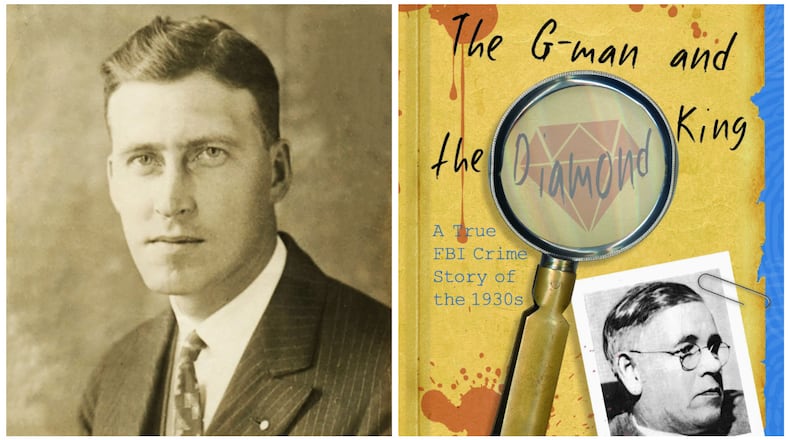Retired FBI Agent William E. Plunkett became familiar with Klein’s name while he, himself, was employed as an agent and took on the task after retirement of researching Klein’s life and death. Out of that research came a book published in 2015 and an Indiana historical marker which will be unveiled this month in College Corner on the anniversary of Klein’s death.
MORE: Butler County cities react to $12M cost to replace fire, police radios
Klein was killed in a shootout with George Barrett, who was being investigated at the time for his involvement in a stolen car ring. Barrett had been a moonshiner in Kentucky in his earlier years and involved in a variety of criminal activities over his lifetime. He had also accumulated a series of wives and girlfriends and his anger over his mother’s disciplining of his son led him to kill both his mother and sister, but he escaped penalty for those killings with bribes.
Barrett’s criminal life led to the shootout in an alley in College Corner, Ind., across the street from where the community’s park sits today.
MORE: Butler County’s 3 most notorious missing person cases
Barrett went to his brother’s house in College Corner to get his gun after hearing in Hamilton that FBI agents were looking for him.
The agents were in a car down the street when Barrett came out of his brother’s house carrying something wrapped in a towel. When he turned down the alley, Agent Klein went after him and ordered him to stop.
Barrett got behind a tree and shots were exchanged. Klein fell, shot five times. The other agent then came around a house and shot Barrett in the leg.
Barrett was actually hit in both legs, but there is still uncertainty about whether one of those injuries was caused by Klein emptying his gun in the exchange or if the shot fired by another FBI Agent actually went through both of his legs.
MORE: The latest local crime news
Klein died at the scene. Barrett was taken to Fort Hamilton Hospital in Hamilton, tried in December and executed by hanging the following March.
After much research through FBI files, Plunkett thought the story would make a good historical screenplay, but ended up turning it into a book — “The G-Man and the Diamond King.” Barrett was known as The Diamond King because of his penchant for carrying diamonds around in his pocket.
Plunkett’s research included 17 books, 10 magazine articles and more than 100 newspaper articles, 10 web sites, three FBI files and the 7th Circuit Court review of Barrett’s case after his conviction.
Neal and Ellis Miller, who grew up in Reily Twp., were visiting their grandparents that week in 1935, and remember the shooting.
Neal Miller, the older of the two brothers, recalls slipping away from his grandfather to get close to the scene after the shooting ended and his lasting memory is the pool of blood around Agent Klein.
“What impressed me was I did not realize there was that much blood in a man,” he said of what he saw at age 7. “That’s what impressed me and it has ever since.”
MORE: For sale: Vintage FBI surveillance van
He said he remembers hearing arguing just before the shooting but did not pay attention until the shooting started. The brothers had gone down to a cherry tree in the yard.
“The shots sounded like bam, bam, bam, bam, bam,” Neal Miller recalled. “Another guy came down from the north and jumped up on the side of the house where a grape arbor was and shot Barrett in the leg. I heard Barrett yell.”
Ellis Miller, 5 at the time, remembers hearing the shots while in that cherry tree and has only limited memory of the events of that day.
“I remember I fell out of the tree and hitting the clothesline when I fell off,” Ellis Miller said. “My brother said we better get to the house when we heard shooting. I remember my grandma held on to me and would not let me see where he was shot. (My grandfather) Otis (Miller) and my brother Neal went over.”
MORE: 1 charged in Hamilton drive-by shooting pleads to avoid death penalty
FBI Director J. Edger Hoover’s agency had been known under a different name prior to 1935 but he went to Congress the year before asking to have the name changed to the Federal Bureau of Investigation to distinguish it from another agency in another government department using the same name. The change became official early in 1935, making Klein the first agent killed in the line of duty in the history of the FBI.
In addition to seeing Klein’s gravesite fixed up and the addition of an FBI badge to the stone and having Klein recognized on the wall of the Cincinnati FBI office, Plunkett wanted to see the agent’s death remembered in the community where it happened.
A historical marker will be dedicated at the College Corner park at 11 a.m. Aug. 16. Plunkett will be on hand for the occasion.
About the Author
